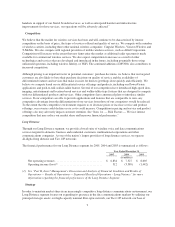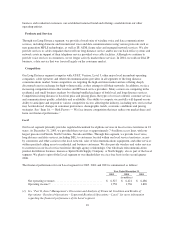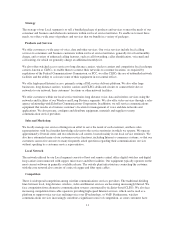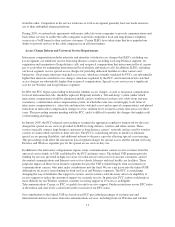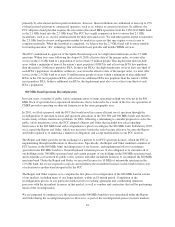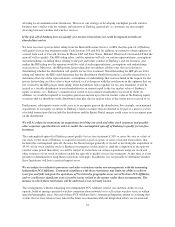Sprint - Nextel 2005 Annual Report Download - page 30
Download and view the complete annual report
Please find page 30 of the 2005 Sprint - Nextel annual report below. You can navigate through the pages in the report by either clicking on the pages listed below, or by using the keyword search tool below to find specific information within the annual report.Privacy-Related regulations
We comply with FCC-mandated rules that limit how carriers may use customer proprietary network information,
or CPNI, for marketing purposes, and specify what carriers must do to safeguard CPNI held by third parties. It
has recently been reported that the call detail records of both wireline and wireless telephone customers are
available from certain Internet-based vendors. Both Congress and state legislatures are considering legislation to
criminalize the sale of call detail records and to further restrict the manner in which carriers make such
information available. The FCC is investigating these practices and is examining whether existing regulations
with respect to CPNI require revision or expansion, which could result in additional costs to us, including
administrative or operational burdens on our customer care, sales, marketing and IT systems.
Tower Siting
Wireless systems must comply with various federal, state and local regulations that govern the siting, lighting
and construction of transmitter towers and antennas, including regulation promulgated by the FCC and Federal
Aviation Administration, or FAA. FCC rules subject certain cell site locations to environmental and historic
preservation statutory requirements. To the extent governmental agencies impose additional requirements on the
tower siting process, the time and cost to construct cell towers could be negatively impacted.
Environmental Compliance
We have identified seven sites, not currently owned or operated by us, that formerly contained manufactured gas
plants that may have been owned or operated by entities acquired by our subsidiary, Centel Corporation, before
we acquired it. We and the current land owner of the site in Columbus, Nebraska are working with the
Environmental Protection Agency, or EPA, pursuant to an administrative consent order. Amounts expended
pursuant to the order are not expected to be material. We are negotiating with the EPA as to whether clean up is
required at two additional sites. In addition, Centel has entered into agreements with another potentially
responsible party to share costs in connection with four of the sites, including two of those where the EPA is
involved. We are working to assess the scope and nature of these sites and our potential responsibility. Other
environmental compliance and remediation expenditures result mainly from the operation of standby power
generators for our telecommunications equipment. These expenditures arise in connection with standards
compliance, permits or occasional remediation, which are usually related to generators, batteries or fuel storage.
Although we cannot assess with certainty the impact of any future compliance and remediation obligations, we
do not believe that future environmental compliance and remediation expenditures will have a material adverse
effect on our financial condition or results of operations.
Patents, Trademarks and Licenses
We own numerous patents, patent applications, service marks and trademarks in the United States and other
countries. We have a program to file applications for trademarks, service marks and patents where we believe
this protection is appropriate. “Sprint,” “PowerVision,” “Sprint PCS,” “Nextel” and “Boost Mobile” are our
registered trademarks. Our services often use the intellectual property of others, such as licensed software, and
we often license copyrights, patents and trademarks of others. In total, these licenses and our copyrights, patents,
trademarks and service marks are of material importance to the business. Generally, our trademarks, trademark
licenses and service marks have no limitation on duration. Our patents and licensed patents have remaining terms
generally ranging from one to 19 years.
We occasionally license our intellectual property to others, including licenses to others to use the trademarks
“Sprint” and “Nextel.”
We have received claims in the past, and may in the future receive claims, that we, or that third parties from
whom we license intellectual property, have infringed on the intellectual property of others. These claims can be
time-consuming and costly to defend, and divert management resources. If these claims are successful, we could
be forced to pay significant damages or stop selling certain products or services, or the third parties from whom
19


